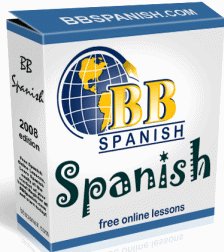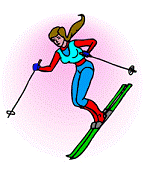
Lesson 12: Spanish Irregularities
VERBOS III (Verbs III)
PRESENTE DE INDICATIVO (Present Tense- Indicative Mood)
VERBOS IRREGULARES(Spanish Irregularities) – Continuation
| VERBS THAT CHANGE “U” IN “UE” |
| JUGAR (Play) |
| Juego Juegas Juega Jugamos
Jugais Juegan |
Note: * Please remember that nosotros (we) and vosotros (you) are always regular.
| VERBS THAT CHANGE “E” IN “I” |
| MEDIR (measure) |
| Mido Mides Mide Medimos
Medis Miden |
Note: * Please remember that nosotros (we) and vosotros (you) are always regular.
Some other verbs that are conjugated in the same way:
Corregir (correct) <![if !vml]> <![endif]>
<![endif]>
<![if !vml]> <![endif]> Compete (compete)
<![endif]> Compete (compete)
Despedir (say goodbye)
Exercise
Complete the sentences with the correct form of the verb in brackets using the present tense, indicative mood:
a) ?Alexis esta (estar) contento porque crecio dos centimetros y ahora mide (medir) 1.77!
Alexis is happy because he grew two centimeters and now his height is 1.77 meters!
b) (Yo) estoy (estar) muy cansada. Compito (competir) esta semana contra una gran rival, y por eso entreno (entrenar) todos los dias durante 8 horas.
(I am very tired. I´m competing this week against a great rival so I train every day for 8 hours).
c) Mi hija juega (jugar) en el parque con sus amiguitas del jardin.
(My daughter plays with her friends from the kindergarten in the park.)
d) – Chicos, despidan (despedir) a la tia que se va — dijo la mama.
(Kids, say goodbye to your auntie that is leaving — said the mother).
e) Mientras el maestro corrige (corregir) los examenes, los alumnos leen.
(While the teacher corrects the exams, the students read). <![if !vml]> <![endif]>
<![endif]>
| VERBS ENDING IN —ACER, -ECER, -OCER, -UCIR THAT CHANGE “C” IN “ZC” IN THE 1ST PERSON OF THE SINGULAR FORM | |||
| NACER (be born) | AGRADECER(thank) | CONOCER(meet) | PRODUCIR(produce) |
| Nazco Naces Nace Nacemos
Naceis Nacen |
Agradezco Agradeces Agradece Agradecemos
Agradeceis Agradecen |
Conozco Conoces Conoce Conocemos
Conoceis Conocen |
Produzco Produces Produce Producimos
Producis Producen |
Note: * Please remember that these Spanish irregularities only affects the 1st person of the singular form (yo)
Some other verbs that are conjugated in the same way:
Abastecer (Supply)
Aparecer (Aparecer)
<![if !vml]> <![endif]><![if !vml]>
<![endif]><![if !vml]> <![endif]><![if !vml]>
<![endif]><![if !vml]> <![endif]> <![if !vml]>
<![endif]> <![if !vml]> <![endif]> Crecer (Grow)
<![endif]> Crecer (Grow)
Merecer (Deserve)
Obedecer (Obey)
Pertenecer (Belong)
<![if !vml]> <![endif]> Traducir (Translate)
<![endif]> Traducir (Translate)
Exercise
Fill in the blanks with the correct alternative
a) El policia dirige — dirigis — dirigimos el transito y los conductores obedece — obedezco — obedecen.
(The policeman manages the traffic and the drivers obey). <![if !vml]> <![endif]>
<![endif]>
b) Ese sombrero le pertenecemos – pertenece — pertenecen a la mujer vestida de rojo.
(That hat belongs to the lady in red). <![if !vml]> <![endif]>
<![endif]>
c) Esa traductora traduce — traducimos — traducis libros de medicina.
(That translator translates Medicine books).
d) Las luces se prenden — prende – prendemos y las estrellas aparecen — aparece — aparezco en escena. El publico aplaudimos — aplauden — aplaude y luego comenzamos — comenzais — comienza la funcion.
(The lights are turned on and the stars appear on stage. The audience applauds and then the show begins).
<![if !vml]> <![endif]>
<![endif]>
| VERBS ENDING —UIR THAT CHANGE “I” IN “Y” |
| INCLUIR (Include) |
| Incluyo Incluyes Incluye Incluimos
Incluis Incluyen |
Note: * Please remember that nosotros (we) and vosotros (you) are always regular.
Some other verbs that are conjugated in the same way:
Atribuir (attribute)
Constituir (constitute)
<![if !vml]> <![endif]>Construir (build)
<![endif]>Construir (build)
Destituir (destituye)
Distribuir (distribuye)
Excluir (exclude)
Huir (escape)
Incluir (include)
Sustituir (substitute)
Exercise
Complete the sentences with the verbs in brackets using the Present tense, indicative mood
a) El paquete turistico incluye (incluir) una excursion a Cerro Otto. (The tourist package incluyes a tour to Cerro Otto)
b) Los ladrones huyen (huir) por la carretera 62.(The thieves escape from Route 62) <![if !vml]> <![endif]>
<![endif]>
c) Cuando distribuimos (distribuir- nosotros) la ropa, la gente se pone muy contenta.(When we distribute the clothes, people get really happy)
<![if !vml]> <![endif]><![if !vml]>
<![endif]><![if !vml]> <![endif]><![if !vml]>
<![endif]><![if !vml]> <![endif]>
<![endif]>
d) Te agradezco (agradecer — yo) mucho la invitacion, pero me temo que no podre ir.(Thank you very much for the invitation, but I´m afraid I won´t be able to go).
e) Ellos construyen (construir) el hospital para poder atender mejor a la poblacion. <![if !vml]> <![endif]>(They build the hospital to better assist the population)
<![endif]>(They build the hospital to better assist the population)
f) Nosotros excluimos (excluir) de la lista a quienes se portan mal. (We exclude from the list those who misbehave).
g) ?Parezco (parecer- yo) mas vieja en esta ropa?(Do I look older in these clothes?)
| VERBS WITH SPECIAL SPANISH IRREGULARITIES | |||||
| CABER (fit) | CAER (fall) | DAR (give) | DECIR (say) | ESTAR (to be) | HACER (do/make) |
| Quepo Cabes Cabe Cabemos
Cabeis Caben |
Caigo Caes Cae Caemos
Caeis Caen |
Doy Das Da Damos
Dais Dan |
Digo Dices Dice Decimos
Decis Dicen
|
Estoy Estas Estan Estamos
Estais Estan |
Hago Haces Hace Hacemos
Haceis Hacen |
| VERBS WITH SPECIAL SPANISH IRREGULARITIES | |||||
| IR (go) | OIR (listen) | PONER (put) | SALIR (go out) | SER (to be) | TENER (have) |
| Voy Vas Va Vamos
Vais Van |
Oigo Oyes Oye Oimos
Ois Oyen
|
Pongo Pones Pone Ponemos
Poneis Ponen
|
Salgo Sales Salen Salimos Salis
Salen
|
Soy Eres Es Somos
Sois Son |
Tengo Tienes Tiene Tenemos
Teneis Tienen |
| VERBS WITH SPECIAL SPANISH IRREGULARITIES | |||
| TRAER (bring) | VALER (to be worth) | VENIR (come) | VER (see) |
| Traigo Traes Trae Traemos
Traeis Traen |
Valgo Vales Vale Valemos
Valeis Valen |
Vengo Vienes Viene Venimos
Venis Vienen |
Veo Ves Ve Vemos
Veis Ven |
Exercises
Complete the sentences with the verb in brackets using the present tense, indicative mood
a) Yo traigo (traer) la torta, tu trae (traer) las bebidas. (I bring the cake, you bring the drinks)
b) Siempre le pongo (poner) mucha sal a las comidas. (I always put a lot of salt to the meals)
c) Oigo (oir — yo) las campanas de la iglesia a lo lejos. ?Tu las puedes (poder) oir? (I can hear the bells from the church far away. Can you hear them?) <![if !vml]> <![endif]>
<![endif]>
d) “Venimos (venir — nosotros) en son de paz”, dijeron ellos (We come in peace, they said)
e) ?Ves (ver — tu) lo mismo que yo? ?No lo puedo (poder — yo) creer! (Do you see the same as I do? I can´t believe it!)
f) No quepo (caber – yo) en este talle. ?Debo haber aumentado de peso! (I can´t fit in this size! I must have gained more kilos!)
g) Nunca conduzco (conducir — yo) alcoholizado. ( I never drive when I am drunk) <![if !vml]> <![endif]>
<![endif]>
h) -?Tengo (tener – yo) muchas cosas para contarte!-, le dijo a su amiga. (“I have a lot of things to tell you!”, she said to her friend)
i) ?Te pones (poner — tu) un abrigo cuando sales (salir — tu)? Siempre refresca a la noche. (Do you wear a coat when you go out? It always gets colder at night)
j) El dice (decir) que es inocente. (He says he is innocent)
k) Cuando no oye (oir — el) bien, pide que le repitan una y otra vez. (When he doesn´t hear very well, he asks for a repetition once and again). <![if !vml]> <![endif]>
<![endif]>
l) Vengo (venir — yo) todos los fines de semana a este gimnasio. ?Y tu? ?Cuando vienes (venir — tu)? (I come every weekend to this gym. And you? When do you come?) <![if !vml]> <![endif]>
<![endif]>
